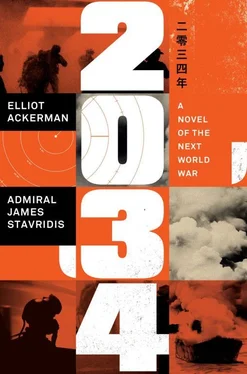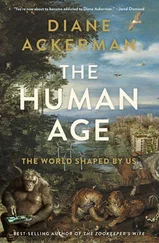Instead he sat and said nothing, allowing her to say whatever the hell she wanted to say. He had gotten what he’d come for. Their daughter was safe. Samantha wouldn’t fight him. This was the only thing that mattered.
They finished their food and the waiter cleared their plates. Chowdhury caught Samantha glancing at her watch. “If you’ve got somewhere else to be that’s fine.”
“You don’t mind?” she asked.
Chowdhury shook his head. When Samantha reached into her purse, he told her to put her wallet away. “I’ve got this.” She protested, and he added, “Please, I’d like to take you out.” She nodded once, thanked him, and also elaborately thanked the staff of the empty restaurant. Then she was gone.
Their waiter presented Chowdhury with a little dish that contained his bill with a pair of fortune cookies on it. Chowdhury stared vacantly at the cookies and thought about what Samantha had said, about his complicity, about how each of us was bound together, from his ex-wife, to his mother, to his daughter, to Hendrickson and Sarah Hunt, and even to this waiter, who would likely only have one table to serve for the entire night.
“Is there anything else I can get you?” the waiter asked.
“Yes, actually,” said Chowdhury. “I’d like to place an order to go.”
He was returning to an empty apartment and ordered enough food to last him several days—another Peking duck, General Tso’s chicken, mixed fried rice, the works. And as he added to his heaping order, the waiter’s subdued expression raised itself into a smile. While the kitchen got to work, Chowdhury sat there waiting, either end of his fortune cookie pinched between his fingers. He then broke the cookie apart and ate it piece by piece, avoiding the fortune inside, which he didn’t read but instead tore compulsively into little pieces.
His food was soon ready. The waiter brought out four bags, saying, “Thank you very much,” as he bowed slightly and set them on the table.
Chowdhury nodded. He looked once more around the empty restaurant before replying, “It’s the very least I could do.” He lifted the bags and headed for the door. On the table all that remained was the little pile of shredded paper for the waiter to brush away.

10:32 July 06, 2034 (GMT+8)
South China Sea
The dream changed a little each time. Hunt would be back in Yokosuka, standing on the dock, all of her ships pulling in at once—the John Paul Jones , the Chung-Hoon , the Carl Levin . What altered was how many more ships kept showing up. Now the scuttled Ford and Miller arrived each night. So, too, did the ships from the South Sea Fleet sunk at anchor in Zhanjiang, the carrier Liaoning , the destroyers Hefei , Lanzhou , Wuhan , Haikou , as well as a blur of smaller ships—frigates and corvettes too numerous to count. Their dozens of gangplanks would fall, the boatswains would pipe their calls, and the crews—American and Chinese alike—would spill onto the dock.
Hunt would be there to meet them. In her dream she is always searching for familiar faces, people like Morris, and like her father. But ever since she gave the order for Zhanjiang, she hasn’t been able to find him on the dock. There are too many ships pulling in at once. She asks for help, but the disembarking crews ignore her or can’t see her—Hunt can’t say which. Are they ghosts? Or is she?
She remembers what her father told her, the first time she had the dream. She remembers how young he appeared, and the way he took her by the arm and said, “You don’t have to do this.”
But it had been done.
The stream of ships, disembarking their thousands—they were the evidence.
Her father had once said to her that if you could snap your fingers and bring all of the dead sailors in the Mediterranean Sea to the surface, you’d be able to walk from the Strait of Gibraltar to the Port of Haifa stepping on the backs of sailors—Greeks, Romans, Carthaginians, Britons, Germans, French, Arabs, and on and on. War at sea began in the Mediterranean, but it might end here, in the South China Sea. Already, in one strike, Sarah Hunt had killed more people than had died across the millennia in the distant Mediterranean.
Among the thickening mass of ghosts, she can’t find her father. She’s calling out for him. But her voice doesn’t carry far enough. And even if it did, what could he tell her?
Nothing—there is nothing he can say to make this crowd disappear so that it could be only the two of them standing on the dock. But she wants to find him, nevertheless. She remembers how he used to take her by the hand and squeeze three times and then she would squeeze four times back. And if she could just feel his hand in hers that might be enough… enough to bring back the dead? To forget what she’d done? To be forgiven? Enough for what?
Night after night she lay in her bed, not quite asleep but not quite awake, asking herself that question.
It was after one such night that Hunt had an in-brief scheduled with a new pilot who’d arrived on the Enterprise . When she saw who he was, she’d requested this in-briefing. She knew his history, how the Iranians had taken him down over Bandar Abbas in an F-35; knew that he’d spent some weeks in captivity, and that he’d pulled strings—a whole bunch of strings—to receive orders to the Enterprise , specifically to the one Hornet squadron that she had so controversially modified. She also knew, as she sat at her desk studying his personnel file, that Major Chris “Wedge” Mitchell, by either luck or his own design, would be the senior-most pilot in that squadron, making him the de facto commanding officer.
He stood in front of her desk, throwing out his chest in salute, his body magnificently still and his thumbs pinned to the seam of his flight suit, as he held the position of attention. Hunt let him stand there for a moment while she paged through not only his file but also a few media clippings her chief of staff had included, ones that spoke to his family history, those generations of Mitchells who’d flown fighters for the Marines. When she glanced up, she couldn’t help but notice that his attention was fixed on the photograph hanging on the wall behind her; it was of the John Paul Jones , the Chung-Hoon , and the Carl Levin , sailing in a column. It had been taken less than six months ago, a fact she struggled to comprehend. She wondered if, perhaps, Wedge was struggling to comprehend the same.
“At ease, Major Mitchell,” she said, shutting his file and welcoming him aboard the Enterprise . She dispensed some pleasantries, asking how his flight out had been and whether he was comfortable in his assigned quarters, to which he replied that everything was fine. Hunt then got to the point. “No doubt you’re aware that I fired your predecessor.”
Wedge was aware.
“He didn’t agree with certain of my directives,” she added. “I assume we’re not going to have the same problem.” Before Wedge could answer, Hunt explained how every vulnerable system had been stripped from the cockpits of his Hornets. “Even after your downing at Bandar Abbas and our defeat at Mischief Reef, there’s still a whole swath of officers in our military who cling to a cult of technology. They cannot bring themselves to acknowledge that an overreliance on these systems has crippled us. They cannot imagine how this might ultimately be the source of our recent defeats.” Hunt then described the situation as she saw it, a dire picture in which America’s strike on Zhanjiang made a counterstrike on the continental United States inevitable. “An old friend of mine from the academy is on the White House staff. He insists that Beijing will back down, that we’ve made our point and enforced our red line. He’s as smart as they come… and he’s been wrong about most things lately, to include this.” And then she looked at Wedge hard and grim, as if she could see every step that was to come, one following another, events progressing like a dark figure stalking a narrow corridor toward an inevitable door. “They’re going to strike at least two US cities. That’ll be their escalation. We hit one. They’ll hit two. Then we’ll have to choose whether or not to de-escalate. We won’t, of course. We’ll strike back, at least three cities. We won’t use strategic nukes; that’s doomsday stuff, not practical. We’ll keep the nukes tactical. Which means they’ll have to come off a carrier. That means you.”
Читать дальше













